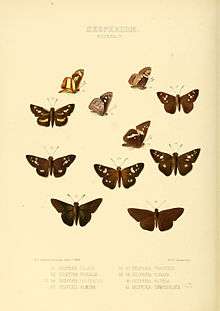
Isma
Isma is a genus of skippers in the family Hesperiidae.
Species
Listed alphabetically.
References
External links

Ismah
‘Iṣmah or ‘Isma (Arabic: عِصْمَة; literally, "protection") is the concept of "impeccability," "immunity from sin", or "infallibility" in Islamic theology, and which is especially prominent in Shia Islam. In Shia theology, Ismah is characeristic of Prophets, Imams, and angels. When attributed to human beings, Ismah means "the ability of avoiding acts of disobedience, in spite of having the power to commit them", as with Prophets and Imams. Along with a pure constitution, excellent qualities, firmness against opponents, and tranquility (as-Sakinah), Ismah is a Divine grace bestowed by God.
An infallible (Arabic: معصوم ma`sūm) is someone who is free from error in leading people to belief, in perceiving divine knowledge, and in practical matters. Prophets must be immune from all errors and sins in order to perform their mission of upholding and promoting the divine religion, interpreting the Qur'an, and establishing a wholesome social system.
The Qur'an's verse of purification implies that God purifies only the Ahl al-Bayt from any kind of sin, error, and defilement in their creation. Both Shia and Sunni hadith state that Ahl al-Bayt refers only to the People of the Cloak and does not include the wives of the Islamic prophet Muhammad.
ISMA
ISMA can refer to:

Isma'ilism
Ismāʿīlism (Arabic: الإسماعيلية al-Ismāʿīliyya; Persian: اسماعیلیان; Sindhi: اسماعيلي; Kurdish: Ismaili; Esmāʿiliyān) is a branch of Shia Islam. The Ismāʿīlī (/ˌɪsmeɪˈɪli/) get their name from their acceptance of Isma'il ibn Jafar as the appointed spiritual successor (Imām) to Ja'far al-Sadiq, wherein they differ from the Twelvers, who accept Musa al-Kadhim, younger brother of Isma'il, as the true Imām.
Tracing its earliest theology to the lifetime of Muhammad, Ismailism rose at one point to become the largest branch of Shī‘ism, climaxing as a political power with the Fatimid Caliphate in the tenth through twelfth centuries. Ismailis believe in the oneness of God, as well as the closing of divine revelation with Muhammad, whom they see as "the final Prophet and Messenger of God to all humanity". The Ismāʿīlī and the Twelvers both accept the same initial Imams from the descendants of Muhammad through his daughter Fatimah and therefore share much of their early history. Both groups see the family of Muhammad (the Ahl al-Bayt) as divinely chosen, infallible (ismah), and guided by God to lead the Islamic community (Ummah), a belief that distinguishes them from the majority Sunni branch of Islam.
Podcasts:

